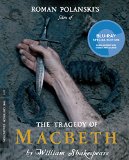| Reviews & Columns |
|
Reviews DVD TV on DVD Blu-ray 4K UHD International DVDs In Theaters Reviews by Studio Video Games Features Collector Series DVDs Easter Egg Database Interviews DVD Talk Radio Feature Articles Columns Anime Talk DVD Savant Horror DVDs The M.O.D. Squad Art House HD Talk Silent DVD
|
DVD Talk Forum |
|
|
| Resources |
|
DVD Price Search Customer Service #'s RCE Info Links |
|
Columns
|
|
|
Macbeth: The Criterion Collection (1971)
The Criterion Collection // R // September 23, 2014
List Price: $39.95 [Buy now and save at Amazon]
The Film:
Like many other receptive teenage students, I was introduced to "Macbeth" at a point where the power of literature had only a tenuous grasp over me, despite the efforts of other significant works -- the bleak poetry of Poe, the grandness of Homer, even other plays by William Shakespeare -- attempting to draw me in. Something about the mysticism of witchcraft navigating a country's politics, the vivid imagery of dreams and madness, and the melancholy ruminations of an undeserving king surrounded by suspicion and deceit finally sparked my appreciation for exploring a piece of work further than the surface. It was only later on that I viewed several of the film versions of Macbeth, even later discovering Roman Polanski's adaptation after seeing Rosemary's Baby and his other works of suspense. Only after developing such an appreciation for Polanski's oeuvre did his rendition of Shakespeare's seminal tragedy seem like an ideal pairing, which culminates in an exceptionally precise and moody telling that, in so many words, appears on-screen nearly as the play did in my impressionable young mind -- with a few alterations, of course.
Macbeth emerged as Polanski's response to the murder of then-wife Sharon Tate, course-correcting from the director's expected return to comedy -- in the vein of The Fearless Vampire Killers -- towards bleaker, richer material and a desire to adapt one of Shakespeare's plays. It's also a violent and psychologically-demanding work, likely the reason why Polanski had such a difficult time obtaining funds for it in the tragedy's aftermath ... and also the reason why his frame of mind was ideal for such a morose and brutal premise. Eventually, with backing from Hugh Hefner's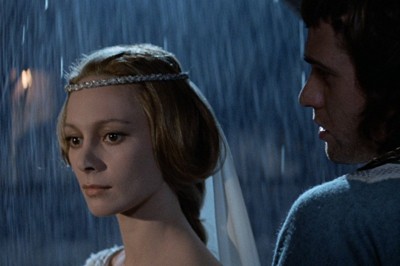 newly-created production wing at Playboy, Polanski fleshed out his macabre telling of the Scottish would-be-king (Jon Finch), whose ascension to the country's throne gets prophesized by a coven of witches encountered in Scotland's misty moors following a great battle. After the first step in his political climb is confirmed shortly after, the story delves into the tenuous balance between destiny and premeditation once King Duncan's crown comes within his reach, as the ambition of Macbeth and his manipulative wife (Francesca Annis) leads them to murder, psychosis, and sedition.
newly-created production wing at Playboy, Polanski fleshed out his macabre telling of the Scottish would-be-king (Jon Finch), whose ascension to the country's throne gets prophesized by a coven of witches encountered in Scotland's misty moors following a great battle. After the first step in his political climb is confirmed shortly after, the story delves into the tenuous balance between destiny and premeditation once King Duncan's crown comes within his reach, as the ambition of Macbeth and his manipulative wife (Francesca Annis) leads them to murder, psychosis, and sedition.
Polanski chose to accurately replicate Shakespeare's lyrical dialogue and the brooding medieval time period in his rendition of Macbeth, letting the story's inherently ominous atmosphere do much of the talking. Influenced by Laurence Olivier's Shakespearean productions and determined to upstage the previous adaptations of the play that, in one way or another, deviated from the essence of the source material, he and co-writer (and Shakespeare authority) Kenneth Tynan tailor the dialogue's tempo in ways that genuinely flow with the grim scenarios. Everything here somehow relates to innate human behavior, a demeanor frequently lost in the grandiose theatricality of stage-y renditions, whether it's in the dynamics of conversation or the psychosis of Macbeth himself through internalized monologues. Polanski's ability to disconcert the audience takes on a strong presence in Shakespeare's prose, eliciting shades of the claustrophobic mania in Repulsion and the dark fantastical conspiracy in Rosemary's Baby through the impacts of the witches' prophecy on both the burgeoning king and his wife.
Casting the Macbeths as somewhat younger, more robust individuals adds a unique dimension to their motivation without altering Shakespeare's intentions, given weight by the considerable talents of Jon Finch and Francesca Annis. Their plotting operates surprisingly well through the gusto of individuals who truly appear as if they haven't been browbeaten by endless politicking, those who've made hasty decisions due to their inexperienced vigor, as does their descent into madness in response to the weight of their deeds. Jon Finch exudes charismatic intensity as Macbeth morphs from a high-ranking soldier to shoehorned royalty, where the character's moments of doubt in his actions are plainly conveyed through Finch's piercing eyes and increasingly weatherworn voice. The manipulation of Lady Macbeth over her husband is, perhaps, even more captivating: coupled with Polanski's outlook on their relationship, Francesca Annis shapes her into an understated and compassionate schemer, a tricky balance since it's easy for her temperament to skew too obviously in one direction or the other.
With the foggy horizon and craggy ruins of the medieval Scottish landscape serving as the backdrop to Macbeth's cutthroat aspiration, rarely touched by rays of sunlight (unless it's for effect), Polanski stages a credible atmosphere for the play's bleak commentary. Hauntingly captured through the lens of Dr. Strangelove and The Omen cinematographer Gilbert Taylor, those desolate expanses drive home the transparency of Macbeth's direct hunger for power, shrewdly juxtaposed with the solemn gazes and intense body language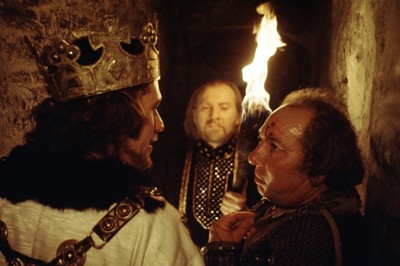 produced by his political machinations. Polanski grasps the potency of the play's haunting imagery, too, and how it relates to Macbeth's waning mental state, so he goes to exquisite lengths to preserve -- and enhance -- those elements in visual effects. From spectral daggers to bodies torn asunder in a dreamscape, he distills this turmoil into an absorbing psychological rumination in motion, exploring the significance of death, fate, and guilt in suggestive and macabre ways. His usage of blood and the color red are particularly intriguing, even before Lady Macbeth's famously symbolic lines.
produced by his political machinations. Polanski grasps the potency of the play's haunting imagery, too, and how it relates to Macbeth's waning mental state, so he goes to exquisite lengths to preserve -- and enhance -- those elements in visual effects. From spectral daggers to bodies torn asunder in a dreamscape, he distills this turmoil into an absorbing psychological rumination in motion, exploring the significance of death, fate, and guilt in suggestive and macabre ways. His usage of blood and the color red are particularly intriguing, even before Lady Macbeth's famously symbolic lines.
Despite the antiquated time period and its fantastical symbolic elements, the themes at the core of Shakespeare's "Macbeth" -- the corrupt making of authority figures and the enduring remorse over ruthless actions that cannot be simply washed away -- linger as a timeless and pertinent cautionary tragedy, to which Roman Polanski has a hand in preserving through this masterful interpretation. A crescendo of gothic dread begins upon the sight of a severed hand grasping a dagger being buried by witches in the film's opening sequences, and that disquieting feeling continues to grow around the director's cynical viewpoint on the stratagems of those that desire power (and those who simply wish to mettle in the affairs of men), underscoring the futility of it all along its bloody path. The longevity of its cautionary message, coupled with its touches of mystic horror, are some of the reasons why "Macbeth" resonates with many at a young age, and it's precisely why Polanski's hybrid of dogged accuracy and his own existential touches endures as one of the better Shakespearean adaptations out there.
The Blu-ray:
Roman Polanski's The Tragedy of Macbeth arrives from The Criterion Collection with a straightforward, yet effective cover design that faintly recalls the intentions of the film's theatrical posters, hovering on the image of the soon-to-be buried hand with medieval-inspired lettering at the top and bottom. That simplicity carries over into the inner artwork: mostly black, with shadows of Macbeth and the red-tinted light of his bed chamber as the inner design touches. The booklet included with this Blu-ray is a bit slimmer than others in the collection, only containing information about the film's transfer and one essay, "Something Wicked" by Terrence Rafferty.
Video and Audio:
The Criterion Collection's restoration of Macbeth starts off with a scan from two separate 35mm sources, which was then sent through a gauntlet of restorative processes to remove both large and small debris and distortion from the negatives. The resulting 2.35:1-framed, 1080p AVC projection of Roman Polanski's film is, in a word, stunning. Some instances of heavy grain and image flickering appear in a few darker exterior sequences, but the image never looks artificial, always retaining a robust film presence that reaps the benefits of such a thorough pass-through. While there are numerous interior sequences that capture depth and detail during close-ups that impress for the film's vintage, both in skin textures and garments, there are a handful of shots centered on a sunlight-bathed Francesca Annis that stand out in how breathtaking they are in their dimensionality and response to the warmth of light. Contrast never swallows up details in the witches' lair or during Macbeth's bleak nightmare sequences, while the generally stony palette and grimy, soggy expanses of the gothic setting are impressively detailed. Criterion have done some rather stunning work in restoring Polanski's Macbeth.
An original 35mm magnetic track serves as the basis for Macbeth's 3-channel sound treatment, and it's largely satisfying, barring a few hindrances. While the dialogue itself remains well-balanced from start to finish, the track requires some added volume to make the clarity of the Shakespearean prose audible; after cranking up about two or three notches louder than normal, the dialogue pours through quite naturally. There's also not a wealth of mid-range bass to be found, either, limiting the sounds of horse gallops and battles to mild lower-end impact that reveals the film's age. The caliber of balanced clarity and separation between channels, however, remains magnificent from start to finish: the punch of a flail and a body jerking after being hung, the clanking of blades on armor, and the subtle splashing of mud and ingredients in the witches' cauldron are crisp, atmospheric, and entirely convincing spread across the three front channels. Optional English subtitles are available, but only if you manually access them during the movie through your player's prompts.
Special Features:
Toil and Trouble: Making Macbeth (1:00:29, 16x9 HD):
Leading the charge in the extras is a fantastic collection of interviews arranged to paint a chronological portrait of the making of Macbeth, where director Roman Polanski, producer Andrew Braunsberg, associate producer (and Playboy connection) Victor Lownes, and actors Francesca Annis and Martin Shaw offer their specific insights on how the film came together. After some discussion about the circumstances behind the film's origin, from Sharon Tate's death to the struggle to find financing, the discussion candidly touches on many aspects of the production itself: integrating with Playboy Productions, the "competition" between Jon Finch and Martin Shaw over the role of Macbeth, Francesca Annis' perspective on her nude scene, and their difficulties in constructing workable medieval machines on a budget. For an hour-long documentary, the story gets told in a brisk and insightful way between all parties, who clearly feel pride in their creation and some frustration with its lackluster reception upon release. As usual with Criterion, they've smartly edited these interviews together.
A more standard making-of feature also appears on the disc in the form of Polanski Meets Macbeth (47:31, 4x3 HD), a vintage documentary directed by Frank Simon in 1971. Starting off with an interview with Playboy founder Hugh Hefner after a shot of armor-clad soldiers on horseback, the piece follows a similar structure to other contemporary docs of its type, only with the participation of Jon Finch, Kenneth Tynan, and other cast and crew unavailable today. Lengthy behind-the-scenes shots of Polanski's direction gets broken up by clips from the film and interviews with cast and crew, as well as casual shots of how everyone -- including Hefner -- handled their downtime between the vigorous shoots. Along with that, a direct interview segment with Dick Cavett and Kenneth Tynan (13:33, 4x3 HD) discuss cross-cultural sensibilities and other off-topics before reaching Macbeth about ten minutes in, where he touches on Hugh Hefner's lack of meddling, adapting the play amid disastrous other takes, and media attention.
Also included are a discussion between Roman Polanski and British theater director Peter Coe, entitled Aquarius: "Two Macbeths" (30:03, 4x3 SD), on "Macbeth" and Shakespeare in general, which becomes interesting as they get their hands dirty with their perspectives on the play's themes and when Polanski has to, in a way, defend scenes he had to cut from the story. Finally, a unique, uncut Trailer (3:40, 16x9 HD) for the film made for the Playboy Theater -- complete with pink title cards discussing the theater's renovation -- rounds out the special features.
Final Thoughts:
When it comes to film adaptations of William Shakespeare's plays, Roman Polanski's Macbeth doesn't get the credit it deserves, often overshadowed by the likes of Kenneth Branagh and Akira Kurosawa when it should be right up there amongst them in conversation. The director's bleak, contemptuous outlook on human nature finds itself more than comfortable in the scheming, the brutality, and the guilt-driven madness surrounding the Scottish king's ascent up the hierarchy. Elevated by Polanski's grasp on haunting imagery and diligence in capturing Shakespeare's native tongue for its ominous atmosphere, it's a marvelous display of how to combine novel interpretation with reverence into a complex, expressive new take on an oft-told story. The Criterion Collection's Blu-ray expectedly looks fantastic and sounds quite solid, and a robust slate of special features -- including new and old documentaries and a pair of worthwhile interviews -- make this a crucial addition to just about any collection. DVDTalk Collector's Series.
Thomas Spurlin, Staff Reviewer -- DVDTalk Reviews | Personal Blog/Site
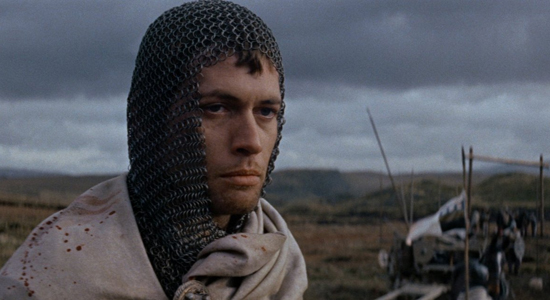 |
Like many other receptive teenage students, I was introduced to "Macbeth" at a point where the power of literature had only a tenuous grasp over me, despite the efforts of other significant works -- the bleak poetry of Poe, the grandness of Homer, even other plays by William Shakespeare -- attempting to draw me in. Something about the mysticism of witchcraft navigating a country's politics, the vivid imagery of dreams and madness, and the melancholy ruminations of an undeserving king surrounded by suspicion and deceit finally sparked my appreciation for exploring a piece of work further than the surface. It was only later on that I viewed several of the film versions of Macbeth, even later discovering Roman Polanski's adaptation after seeing Rosemary's Baby and his other works of suspense. Only after developing such an appreciation for Polanski's oeuvre did his rendition of Shakespeare's seminal tragedy seem like an ideal pairing, which culminates in an exceptionally precise and moody telling that, in so many words, appears on-screen nearly as the play did in my impressionable young mind -- with a few alterations, of course.
Macbeth emerged as Polanski's response to the murder of then-wife Sharon Tate, course-correcting from the director's expected return to comedy -- in the vein of The Fearless Vampire Killers -- towards bleaker, richer material and a desire to adapt one of Shakespeare's plays. It's also a violent and psychologically-demanding work, likely the reason why Polanski had such a difficult time obtaining funds for it in the tragedy's aftermath ... and also the reason why his frame of mind was ideal for such a morose and brutal premise. Eventually, with backing from Hugh Hefner's
 newly-created production wing at Playboy, Polanski fleshed out his macabre telling of the Scottish would-be-king (Jon Finch), whose ascension to the country's throne gets prophesized by a coven of witches encountered in Scotland's misty moors following a great battle. After the first step in his political climb is confirmed shortly after, the story delves into the tenuous balance between destiny and premeditation once King Duncan's crown comes within his reach, as the ambition of Macbeth and his manipulative wife (Francesca Annis) leads them to murder, psychosis, and sedition.
newly-created production wing at Playboy, Polanski fleshed out his macabre telling of the Scottish would-be-king (Jon Finch), whose ascension to the country's throne gets prophesized by a coven of witches encountered in Scotland's misty moors following a great battle. After the first step in his political climb is confirmed shortly after, the story delves into the tenuous balance between destiny and premeditation once King Duncan's crown comes within his reach, as the ambition of Macbeth and his manipulative wife (Francesca Annis) leads them to murder, psychosis, and sedition. Polanski chose to accurately replicate Shakespeare's lyrical dialogue and the brooding medieval time period in his rendition of Macbeth, letting the story's inherently ominous atmosphere do much of the talking. Influenced by Laurence Olivier's Shakespearean productions and determined to upstage the previous adaptations of the play that, in one way or another, deviated from the essence of the source material, he and co-writer (and Shakespeare authority) Kenneth Tynan tailor the dialogue's tempo in ways that genuinely flow with the grim scenarios. Everything here somehow relates to innate human behavior, a demeanor frequently lost in the grandiose theatricality of stage-y renditions, whether it's in the dynamics of conversation or the psychosis of Macbeth himself through internalized monologues. Polanski's ability to disconcert the audience takes on a strong presence in Shakespeare's prose, eliciting shades of the claustrophobic mania in Repulsion and the dark fantastical conspiracy in Rosemary's Baby through the impacts of the witches' prophecy on both the burgeoning king and his wife.
Casting the Macbeths as somewhat younger, more robust individuals adds a unique dimension to their motivation without altering Shakespeare's intentions, given weight by the considerable talents of Jon Finch and Francesca Annis. Their plotting operates surprisingly well through the gusto of individuals who truly appear as if they haven't been browbeaten by endless politicking, those who've made hasty decisions due to their inexperienced vigor, as does their descent into madness in response to the weight of their deeds. Jon Finch exudes charismatic intensity as Macbeth morphs from a high-ranking soldier to shoehorned royalty, where the character's moments of doubt in his actions are plainly conveyed through Finch's piercing eyes and increasingly weatherworn voice. The manipulation of Lady Macbeth over her husband is, perhaps, even more captivating: coupled with Polanski's outlook on their relationship, Francesca Annis shapes her into an understated and compassionate schemer, a tricky balance since it's easy for her temperament to skew too obviously in one direction or the other.
With the foggy horizon and craggy ruins of the medieval Scottish landscape serving as the backdrop to Macbeth's cutthroat aspiration, rarely touched by rays of sunlight (unless it's for effect), Polanski stages a credible atmosphere for the play's bleak commentary. Hauntingly captured through the lens of Dr. Strangelove and The Omen cinematographer Gilbert Taylor, those desolate expanses drive home the transparency of Macbeth's direct hunger for power, shrewdly juxtaposed with the solemn gazes and intense body language
 produced by his political machinations. Polanski grasps the potency of the play's haunting imagery, too, and how it relates to Macbeth's waning mental state, so he goes to exquisite lengths to preserve -- and enhance -- those elements in visual effects. From spectral daggers to bodies torn asunder in a dreamscape, he distills this turmoil into an absorbing psychological rumination in motion, exploring the significance of death, fate, and guilt in suggestive and macabre ways. His usage of blood and the color red are particularly intriguing, even before Lady Macbeth's famously symbolic lines.
produced by his political machinations. Polanski grasps the potency of the play's haunting imagery, too, and how it relates to Macbeth's waning mental state, so he goes to exquisite lengths to preserve -- and enhance -- those elements in visual effects. From spectral daggers to bodies torn asunder in a dreamscape, he distills this turmoil into an absorbing psychological rumination in motion, exploring the significance of death, fate, and guilt in suggestive and macabre ways. His usage of blood and the color red are particularly intriguing, even before Lady Macbeth's famously symbolic lines. Despite the antiquated time period and its fantastical symbolic elements, the themes at the core of Shakespeare's "Macbeth" -- the corrupt making of authority figures and the enduring remorse over ruthless actions that cannot be simply washed away -- linger as a timeless and pertinent cautionary tragedy, to which Roman Polanski has a hand in preserving through this masterful interpretation. A crescendo of gothic dread begins upon the sight of a severed hand grasping a dagger being buried by witches in the film's opening sequences, and that disquieting feeling continues to grow around the director's cynical viewpoint on the stratagems of those that desire power (and those who simply wish to mettle in the affairs of men), underscoring the futility of it all along its bloody path. The longevity of its cautionary message, coupled with its touches of mystic horror, are some of the reasons why "Macbeth" resonates with many at a young age, and it's precisely why Polanski's hybrid of dogged accuracy and his own existential touches endures as one of the better Shakespearean adaptations out there.
The Blu-ray:
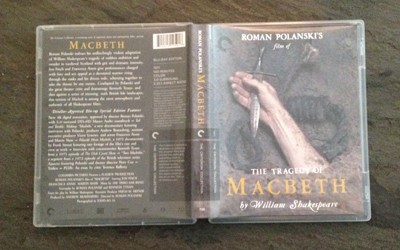 | 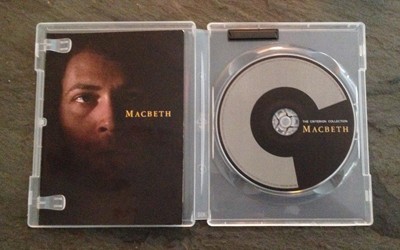 |
Roman Polanski's The Tragedy of Macbeth arrives from The Criterion Collection with a straightforward, yet effective cover design that faintly recalls the intentions of the film's theatrical posters, hovering on the image of the soon-to-be buried hand with medieval-inspired lettering at the top and bottom. That simplicity carries over into the inner artwork: mostly black, with shadows of Macbeth and the red-tinted light of his bed chamber as the inner design touches. The booklet included with this Blu-ray is a bit slimmer than others in the collection, only containing information about the film's transfer and one essay, "Something Wicked" by Terrence Rafferty.
Video and Audio:
The Criterion Collection's restoration of Macbeth starts off with a scan from two separate 35mm sources, which was then sent through a gauntlet of restorative processes to remove both large and small debris and distortion from the negatives. The resulting 2.35:1-framed, 1080p AVC projection of Roman Polanski's film is, in a word, stunning. Some instances of heavy grain and image flickering appear in a few darker exterior sequences, but the image never looks artificial, always retaining a robust film presence that reaps the benefits of such a thorough pass-through. While there are numerous interior sequences that capture depth and detail during close-ups that impress for the film's vintage, both in skin textures and garments, there are a handful of shots centered on a sunlight-bathed Francesca Annis that stand out in how breathtaking they are in their dimensionality and response to the warmth of light. Contrast never swallows up details in the witches' lair or during Macbeth's bleak nightmare sequences, while the generally stony palette and grimy, soggy expanses of the gothic setting are impressively detailed. Criterion have done some rather stunning work in restoring Polanski's Macbeth.
An original 35mm magnetic track serves as the basis for Macbeth's 3-channel sound treatment, and it's largely satisfying, barring a few hindrances. While the dialogue itself remains well-balanced from start to finish, the track requires some added volume to make the clarity of the Shakespearean prose audible; after cranking up about two or three notches louder than normal, the dialogue pours through quite naturally. There's also not a wealth of mid-range bass to be found, either, limiting the sounds of horse gallops and battles to mild lower-end impact that reveals the film's age. The caliber of balanced clarity and separation between channels, however, remains magnificent from start to finish: the punch of a flail and a body jerking after being hung, the clanking of blades on armor, and the subtle splashing of mud and ingredients in the witches' cauldron are crisp, atmospheric, and entirely convincing spread across the three front channels. Optional English subtitles are available, but only if you manually access them during the movie through your player's prompts.
Special Features:
Toil and Trouble: Making Macbeth (1:00:29, 16x9 HD):
Leading the charge in the extras is a fantastic collection of interviews arranged to paint a chronological portrait of the making of Macbeth, where director Roman Polanski, producer Andrew Braunsberg, associate producer (and Playboy connection) Victor Lownes, and actors Francesca Annis and Martin Shaw offer their specific insights on how the film came together. After some discussion about the circumstances behind the film's origin, from Sharon Tate's death to the struggle to find financing, the discussion candidly touches on many aspects of the production itself: integrating with Playboy Productions, the "competition" between Jon Finch and Martin Shaw over the role of Macbeth, Francesca Annis' perspective on her nude scene, and their difficulties in constructing workable medieval machines on a budget. For an hour-long documentary, the story gets told in a brisk and insightful way between all parties, who clearly feel pride in their creation and some frustration with its lackluster reception upon release. As usual with Criterion, they've smartly edited these interviews together.
A more standard making-of feature also appears on the disc in the form of Polanski Meets Macbeth (47:31, 4x3 HD), a vintage documentary directed by Frank Simon in 1971. Starting off with an interview with Playboy founder Hugh Hefner after a shot of armor-clad soldiers on horseback, the piece follows a similar structure to other contemporary docs of its type, only with the participation of Jon Finch, Kenneth Tynan, and other cast and crew unavailable today. Lengthy behind-the-scenes shots of Polanski's direction gets broken up by clips from the film and interviews with cast and crew, as well as casual shots of how everyone -- including Hefner -- handled their downtime between the vigorous shoots. Along with that, a direct interview segment with Dick Cavett and Kenneth Tynan (13:33, 4x3 HD) discuss cross-cultural sensibilities and other off-topics before reaching Macbeth about ten minutes in, where he touches on Hugh Hefner's lack of meddling, adapting the play amid disastrous other takes, and media attention.
Also included are a discussion between Roman Polanski and British theater director Peter Coe, entitled Aquarius: "Two Macbeths" (30:03, 4x3 SD), on "Macbeth" and Shakespeare in general, which becomes interesting as they get their hands dirty with their perspectives on the play's themes and when Polanski has to, in a way, defend scenes he had to cut from the story. Finally, a unique, uncut Trailer (3:40, 16x9 HD) for the film made for the Playboy Theater -- complete with pink title cards discussing the theater's renovation -- rounds out the special features.
Final Thoughts:
When it comes to film adaptations of William Shakespeare's plays, Roman Polanski's Macbeth doesn't get the credit it deserves, often overshadowed by the likes of Kenneth Branagh and Akira Kurosawa when it should be right up there amongst them in conversation. The director's bleak, contemptuous outlook on human nature finds itself more than comfortable in the scheming, the brutality, and the guilt-driven madness surrounding the Scottish king's ascent up the hierarchy. Elevated by Polanski's grasp on haunting imagery and diligence in capturing Shakespeare's native tongue for its ominous atmosphere, it's a marvelous display of how to combine novel interpretation with reverence into a complex, expressive new take on an oft-told story. The Criterion Collection's Blu-ray expectedly looks fantastic and sounds quite solid, and a robust slate of special features -- including new and old documentaries and a pair of worthwhile interviews -- make this a crucial addition to just about any collection. DVDTalk Collector's Series.
|
| Popular Reviews |
| Sponsored Links |
|
|
| Sponsored Links |
|
|
| Release List | Reviews | Shop | Newsletter | Forum | DVD Giveaways | Blu-Ray | Advertise |
|
Copyright 2024 DVDTalk.com All Rights Reserved. Legal Info, Privacy Policy, Terms of Use,
Manage Preferences,
Your Privacy Choices | |||||||









